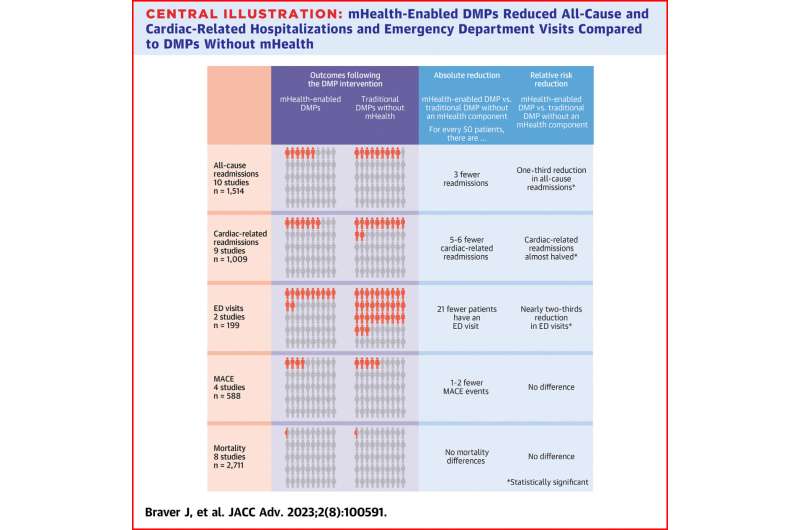This article has been reviewed according to Science X's editorial process and policies. Editors have highlighted the following attributes while ensuring the content's credibility:
fact-checked
proofread
Digital cardiac rehab program found to be more effective in reducing hospital readmission

Digital cardiac rehabilitation programs substantially reduce a person's chance of being readmitted to hospital with heart disease compared to traditional face to face programs, according to a new study by researchers at the Baker Heart and Diabetes Institute.
The analysis of 18 global studies, including those conducted in Australia, shows that digital health programs involving mobile apps, SMS, remoting monitoring or video or phone conferencing, are very effective in reducing hospital readmissions or emergency department presentations for people with heart disease such as those who have had a heart attack.
With previous studies showing as few as 37% of Australians participate in cardiac rehabilitation after suffering an acute heart event, the need for novel models of delivering disease management programs to support cardiac care is more important than ever for these patients who are now at higher risk of further heart events or complications.
What's more, unlike traditional face to face programs delivered in the community or in a hospital setting, programs that employ mobile health technology are able to reach more patients in a convenient manner by allowing them to complete their program at a time and place that suits their needs, according to the study in JACC:Advances by Baker Institute Ph.D. candidate, Justin Braver.
But the key component that underpins these results is not clearly identified. Instead it seems a combination of factors working together is at play, helping to improve patient education, communication with their clinician and enhance patient engagement.
Senior Author and Head of Preclinical Disease and Prevention, Associate Professor Melinda Carrington said this study shows Disease Management Programs, integrated with remote delivery methods such as telehealth, SMS and cardiac rehabilitation delivered via digital technology, provide patients with choice, access and control of their care.
The study showed a 32% reduction in the relative risk of rehospitalization for any cause and a 45% relative risk reduction in cardiovascular-related rehospitalizations in people who utilized a mobile health Disease Management Program compared to a traditional program.
Disease Management Programs are a framework for providing care for patients with cardiac disease. Most are coordinated by nurses in collaboration with health care professionals and typically include heart health education, care coordination, exercise prescription, medication management and adherence, self-monitoring strategies, psychosocial support, behavior change and goal setting.
Carrington says, "The top line message is to participate in a cardiac rehabilitation program, in whatever form suits you and is available to you, because we know that there is significant evidence showing that it is effective.
"About 4.2 million Australians are living with a cardiovascular condition, and of those, 1.2 million have been diagnosed with heart disease and are five to seven times more likely to suffer future heart events than those without heart disease," she says.
"We need to look at more modern day, alternative delivery methods of cardiac rehabilitation to increase access and engagement to improve the quality of life for people with heart disease and to reduce preventable and costly readmissions to hospital.
"That's why mobile health-enabled rehabilitation programs should be considered for improving outcomes in people with heart disease, allowing them to choose their preferred program type and setting.
"For governments and policy makers, there is also a strong message about cost efficiencies when it comes to health care delivery by reducing clinician and health system burden.
"Rather than replace the entire traditional model of care which has a proven track record of success for a digital solution, digitally integrated models may provide disease management strategies in a more engaging, accessible and scalable manner."
More information: Justin Braver et al, Digital Health Programs to Reduce Readmissions in Coronary Artery Disease, JACC: Advances (2023). DOI: 10.1016/j.jacadv.2023.100591





















